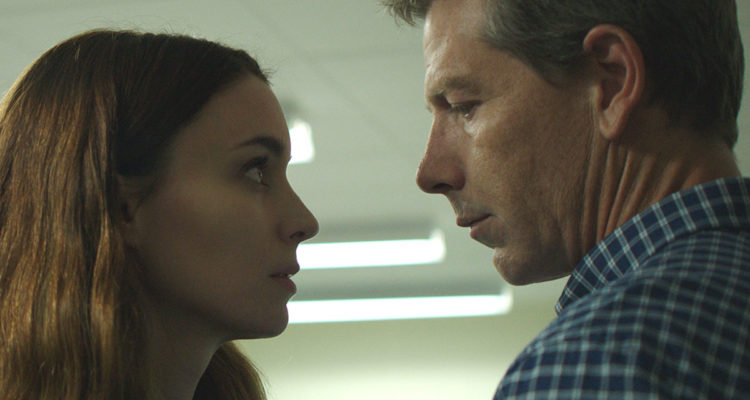TELLURIDE – There is something fantastic about a movie that can make people inherently uncomfortable without resorting to torture porn aesthetics or blatant sexual perversion. When it showcases characters you can relate to, who make decisions you can’t fathom for one reason or another. From all given accounts writer David Harrower accomplished this feat in his 2005 award winning play “Blackbird” which he’s now adapted into a film re-titled “Una” under the direction of noted Australian stage director Benedict Andrews. Having never seen a performance of “Blackbird” I can only go from what I’ve read and been told about the play. Based on that knowledge it’s clear that “Una” is not your typical stage to screen adaptation and the result is, at best, fascinating.
The film begins somewhere in suburban England with a teenage girl walking into a backyard that is clearly not her own and standing in front of a shed. Cut to an adult Una (Rooney Mara) in a dance club, and statuesque as hard pounding dance music and strobe lights flash around her. She has sex with a stranger in a bathroom stall. She walks home as the sun rises on the same street we saw the young girl earlier. She gets ready for work, but is cold to her mother (Tara Fitzgerald). She calls in sick and takes a detour across the country. She’s heading to the factory workplace of Ray (Ben Mendelsohn), who has no idea her arrival is imminent and has not seen her in 15 years.

As the film cuts back to the 13-year-old we saw at the beginning of the film, we discover that girl was Una and she developed what she believed was a romantic relationship with her 40-year-old neighbor, Ray. She’s been shattered by the experience ever since, but not for the reasons you’d immediately think of. Having finally tracked down Ray – now going by Pete – she wants answers. Answers to things she’s never understood since he went “away.” A four-year prison sentence that even as a teenager Una could not comprehend.
Harrower smartly expands the context of story bringing in supporting characters such as Ray’s new girlfriend Yvonne (Natasha Little), his frustrated boss Mark (Tobias Menzies), and his co-worker Scott (Riz Ahmed) who becomes Una’s unknowing pawn in the proceedings. And those actions in particular are what make Una a character that is much harder to even sympathize with than she should be. That is Harrower’s biggest miscalculation. When you set a conflict such as this in a much bigger world than a single scene play, at some point the audience is going to lose patience.
 Like the original source material, “Una” wants to leave you conflicted on how you feel about Una and Ray’s relationship then and now (if there really is a relationship in the present). Thankfully, Mara is incredible at conveying Una’s deep seeded pain. At one moment Una finally lets it all out and it might be the most vulnerable Mara has ever appeared on screen. Unfortunately, the film’s third act – which differentiates from the play – almost turns her into a villain. As for Mendelsohn, the Aussie delivers yet another strong turn just as you’d expect him to. He plays Ray with just enough of a hint of creepiness to make you question his insistence that he truly loved her, and never touched another underage girl besides Una.
Like the original source material, “Una” wants to leave you conflicted on how you feel about Una and Ray’s relationship then and now (if there really is a relationship in the present). Thankfully, Mara is incredible at conveying Una’s deep seeded pain. At one moment Una finally lets it all out and it might be the most vulnerable Mara has ever appeared on screen. Unfortunately, the film’s third act – which differentiates from the play – almost turns her into a villain. As for Mendelsohn, the Aussie delivers yet another strong turn just as you’d expect him to. He plays Ray with just enough of a hint of creepiness to make you question his insistence that he truly loved her, and never touched another underage girl besides Una.
Questioning some of the decisions Harrower made expanding his work on a new canvas is warranted. You cannot blame the film’s faults, however, on Andrews. For a feature debut, “Una” is bursting with exceptional confidence and style. The aesthetic is Jonathan Glazer meets Andrea Arnold and it assures that some of the script’s more staged scenes hold your attention (Yorgos Lanthimos’ longtime cinematographer Thimios Bakatakis deserves kudos a good chunk of the credit as well).
However, at the end of “Una,” you’re simply left with a “he said, she said” held on the shoulders of two great actors. It’s simply not enough to make you care. [B-]
Click here for all of our coverage from the 2016 Telluride Film Festival.


